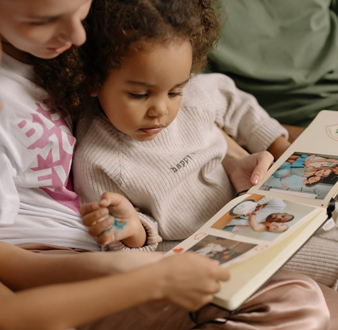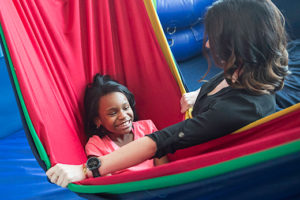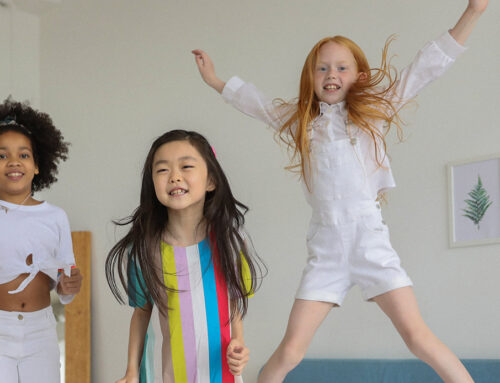While the holidays are filled with fun activities, family gatherings, and seasonal celebrations, they can also bring a lot of stress for neurodiverse individuals, such as those with autism, ADHD, down syndrome, and sensory processing disorders. Disruptions in schedules, travel, crowds, and interacting with new people can be overwhelming and make it difficult for children to enjoy the holiday festivities. With preparation and flexibility, you can ensure the whole family has an enjoyable time during the holidays.
Here are some tips to help reduce holiday stress:
1. Plan ahead!
- Create social stories or visual schedules to help your child know what to expect. Use pictures and simple text, and outline each step so they can orient themselves.
- Try role playing with your child so they can practice meeting new people, or visiting with family members they haven’t seen in a while.
- Talk with your child about what to expect as much as possible, and highlight the positive aspects of family dinners, gift giving, travel, decorations, and more.
- Show your child family photos prior to visiting so they can familiarize themselves with everyone. We also recommend using family photos in your social stories.
2. Create a Quiet Zone
- Arrange a quiet place for your child to be able to retreat to if they get overwhelmed with their favorite toys, books, or comfort items. Whether at a relative’s house, restaurant, or hotel, it’s important for your child to be able to take a break.
3. Create a Distress Signal
- Create a hand signal with your child, or use a sign-language sign so they can signal for help if they become stressed. If your child knows a constructive way to get your attention, they’ll build self-management skills and gain independence in a way that limits outbursts and tantrums.
4. Take Breaks
- If your child exhibits signs of distress, such as an increase in humming, rocking back and forth, or hand flapping, get them to their quiet zone right away.
5. Unbox Toys Before Wrapping
- Ask your family members to unbox toys before wrapping them, so your child can play with the toy immediately. This means more fun and less frustrating waiting for your child.
6. Help Family Members with Gifts
- Provide gift recommendations or help to your family so they know your child’s preferences. This is a great way to prevent your child from saying “This isn’t what I wanted” or “I don’t like this” in front of relatives who may not understand and whose feelings may be hurt.
- View our Gift Guides for additional ideas (10 Gift Ideas for Children with Autism, Holiday Gift Ideas Promoting Development)
7. Decorate Gradually
- If your child has difficulty processing sudden changes in their environment, decorate gradually so they can get acclimated to the changes. We also suggest decorating or shopping for decorations together so your child can participate. Keep in mind that some decorations, like flashing lights, might be overstimulating.
8. Advocate for Your Child’s Preferences
- Let family members know about your child’s boundaries in advance, such as not liking hugs, and support your child if people try to push those boundaries. By showing your child that their needs are valid you can help them self-advocate.
9. Bring Food, If Needed
- Make sure there will be food available that your child enjoys eating, even if you have to bring it yourself.
10. Prioritize
- Think about what holiday traditions are most important to you, and in terms of what your child tolerates. You don’t have to go to every event you’re invited to, or bring your children to every holiday event. It’s important to rest and enjoy the holidays, don’t worry about pleasing other people.
11. Plan Downtime
- Be sure to schedule down time so you and your child don’t get burnt out.




12. Create a Schedule
- Put together a winter break routine with all the activities and events you plan to do. This structure will help your child to know what to expect and reduce issues with transitioning from their school routine.
13. Create a Calendar
- Put all your upcoming events on one calendar and post it somewhere your whole family can see it so everyone knows what to expect.
14. Packing Prep
- Be sure to bring your child’s favorite toy and any items that help soothe them in times of stress. Favorite snacks are also highly encouraged.
While these are helpful tips to prepare for the Holidays, it’s also important to acknowledge that you can’t prepare for everything. Unexpected issues or disruptions are bound to happen, you just have to support yourself and your family as best as you can. It’s okay if your child refuses to wear special holiday clothing, sit at the table for a whole meal, or stay focused on gift giving. Just being together is the most important part of the holidays.

Eyas Landing is a therapy clinic with a mission to provide evidence-based and family-centered therapy services for children, adolescents, and their families. The primary goal is to deliver relationship-based interventions within the most natural environments and to empower families to reach their full potential. To achieve this goal, our highly educated, compassionate staff dedicates time and expertise to create experiences that maximize therapeutic outcomes. The strength, determination, and perseverance of our clients are evident as they succeed in therapy, and ultimately in their daily lives.
Eyas Landing offers a wide range of comprehensive services including Speech Therapy, Occupational Therapy, Physical Therapy, ABA Therapy, Social Work, Family Therapy, and Neuropsych testing. Services are provided throughout the Chicagoland area via Telehealth, In-Home, and in our state of the art clinic.
Want to learn more or you have a specific question? Feel free to connect with us here!


